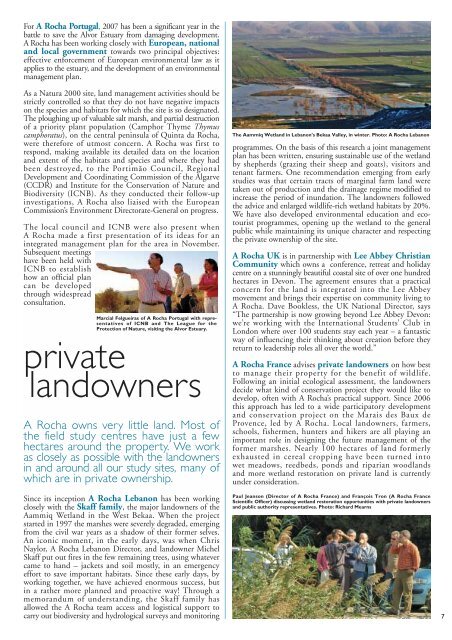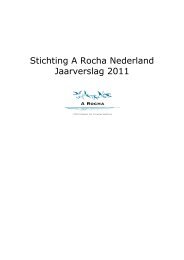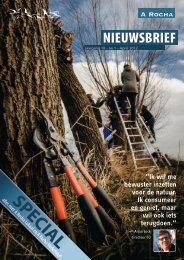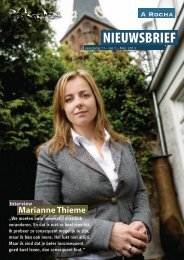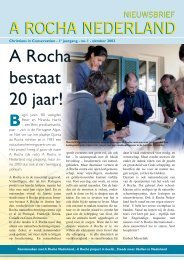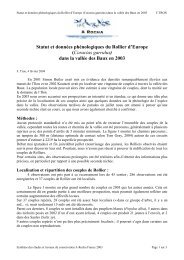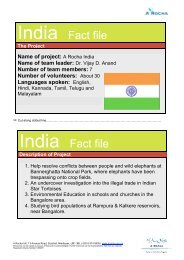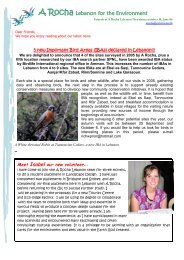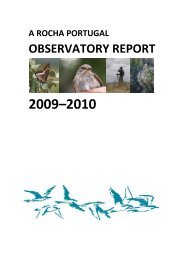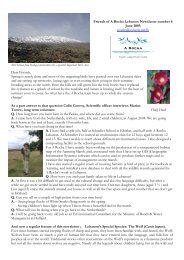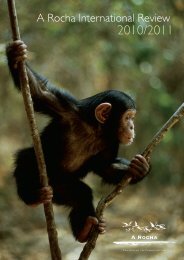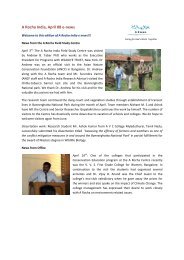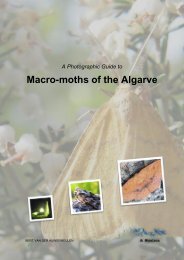2007-2008 International Review - A Rocha
2007-2008 International Review - A Rocha
2007-2008 International Review - A Rocha
You also want an ePaper? Increase the reach of your titles
YUMPU automatically turns print PDFs into web optimized ePapers that Google loves.
For A <strong>Rocha</strong> Portugal, <strong>2007</strong> has been a significant year in the<br />
battle to save the Alvor Estuary from damaging development.<br />
A <strong>Rocha</strong> has been working closely with European, national<br />
and local government towards two principal objectives:<br />
effective enforcement of European environmental law as it<br />
applies to the estuary, and the development of an environmental<br />
management plan.<br />
As a Natura 2000 site, land management activities should be<br />
strictly controlled so that they do not have negative impacts<br />
on the species and habitats for which the site is so designated.<br />
The ploughing up of valuable salt marsh, and partial destruction<br />
of a priority plant population (Camphor Thyme Thymus<br />
camphoratus), on the central peninsula of Quinta da <strong>Rocha</strong>,<br />
were therefore of utmost concern. A <strong>Rocha</strong> was first to<br />
respond, making available its detailed data on the location<br />
and extent of the habitats and species and where they had<br />
been destroyed, to the Portimão Council, Regional<br />
Development and Coordinating Commission of the Algarve<br />
(CCDR) and Institute for the Conservation of Nature and<br />
Biodiversity (ICNB). As they conducted their follow-up<br />
investigations, A <strong>Rocha</strong> also liaised with the European<br />
Commission’s Environment Directorate-General on progress.<br />
The local council and ICNB were also present when<br />
A <strong>Rocha</strong> made a first presentation of its ideas for an<br />
integrated management plan for the area in November.<br />
Subsequent meetings<br />
have been held with<br />
ICNB to establish<br />
how an official plan<br />
can be developed<br />
through widespread<br />
consultation.<br />
Marcial Felgueiras of A <strong>Rocha</strong> Portugal with representatives<br />
of ICNB and The League for the<br />
Protection of Nature, visiting the Alvor Estuary.<br />
private<br />
landowners<br />
A <strong>Rocha</strong> owns very little land. Most of<br />
the field study centres have just a few<br />
hectares around the property. We work<br />
as closely as possible with the landowners<br />
in and around all our study sites, many of<br />
which are in private ownership.<br />
Since its inception A <strong>Rocha</strong> Lebanon has been working<br />
closely with the Skaff family, the major landowners of the<br />
Aammiq Wetland in the West Bekaa. When the project<br />
started in 1997 the marshes were severely degraded, emerging<br />
from the civil war years as a shadow of their former selves.<br />
An iconic moment, in the early days, was when Chris<br />
Naylor, A <strong>Rocha</strong> Lebanon Director, and landowner Michel<br />
Skaff put out fires in the few remaining trees, using whatever<br />
came to hand – jackets and soil mostly, in an emergency<br />
effort to save important habitats. Since these early days, by<br />
working together, we have achieved enormous success, but<br />
in a rather more planned and proactive way! Through a<br />
memorandum of understanding, the Skaff family has<br />
allowed the A <strong>Rocha</strong> team access and logistical support to<br />
carry out biodiversity and hydrological surveys and monitoring<br />
The Aammiq Wetland in Lebanon’s Bekaa Valley, in winter. Photo: A <strong>Rocha</strong> Lebanon<br />
programmes. On the basis of this research a joint management<br />
plan has been written, ensuring sustainable use of the wetland<br />
by shepherds (grazing their sheep and goats), visitors and<br />
tenant farmers. One recommendation emerging from early<br />
studies was that certain tracts of marginal farm land were<br />
taken out of production and the drainage regime modified to<br />
increase the period of inundation. The landowners followed<br />
the advice and enlarged wildlife-rich wetland habitats by 20%.<br />
We have also developed environmental education and ecotourist<br />
programmes, opening up the wetland to the general<br />
public while maintaining its unique character and respecting<br />
the private ownership of the site.<br />
A <strong>Rocha</strong> UK is in partnership with Lee Abbey Christian<br />
Community which owns a conference, retreat and holiday<br />
centre on a stunningly beautiful coastal site of over one hundred<br />
hectares in Devon. The agreement ensures that a practical<br />
concern for the land is integrated into the Lee Abbey<br />
movement and brings their expertise on community living to<br />
A <strong>Rocha</strong>. Dave Bookless, the UK National Director, says<br />
“The partnership is now growing beyond Lee Abbey Devon:<br />
we’re working with the <strong>International</strong> Students’ Club in<br />
London where over 100 students stay each year – a fantastic<br />
way of influencing their thinking about creation before they<br />
return to leadership roles all over the world.”<br />
A <strong>Rocha</strong> France advises private landowners on how best<br />
to manage their property for the benefit of wildlife.<br />
Following an initial ecological assessment, the landowners<br />
decide what kind of conservation project they would like to<br />
develop, often with A <strong>Rocha</strong>’s practical support. Since 2006<br />
this approach has led to a wide participatory development<br />
and conservation project on the Marais des Baux de<br />
Provence, led by A <strong>Rocha</strong>. Local landowners, farmers,<br />
schools, fishermen, hunters and hikers are all playing an<br />
important role in designing the future management of the<br />
former marshes. Nearly 100 hectares of land formerly<br />
exhausted in cereal cropping have been turned into<br />
wet meadows, reedbeds, ponds and riparian woodlands<br />
and more wetland restoration on private land is currently<br />
under consideration.<br />
Paul Jeanson (Director of A <strong>Rocha</strong> France) and François Tron (A <strong>Rocha</strong> France<br />
Scientific Officer) discussing wetland restoration opportunities with private landowners<br />
and public authority representatives. Photo: Richard Mearns<br />
7


